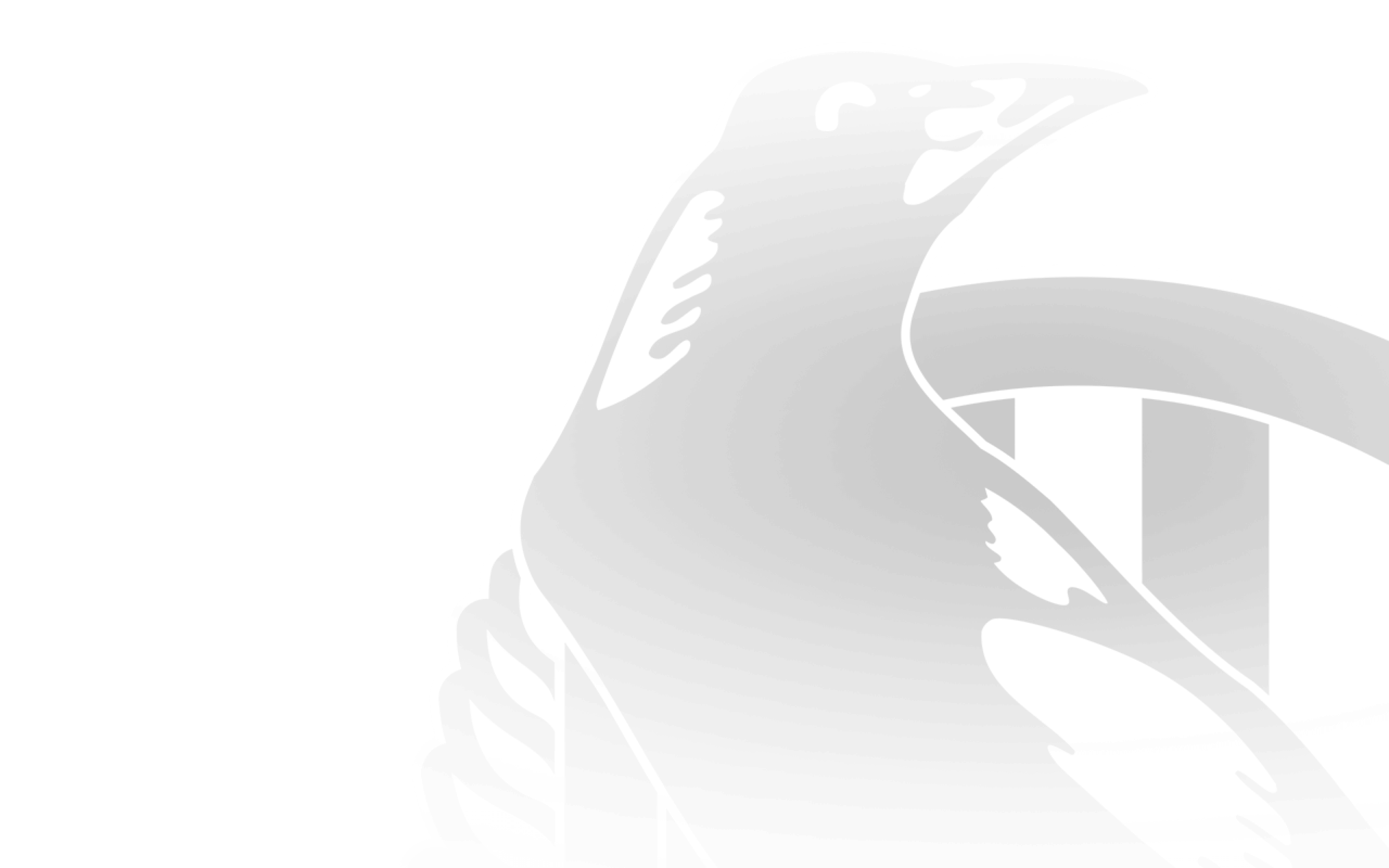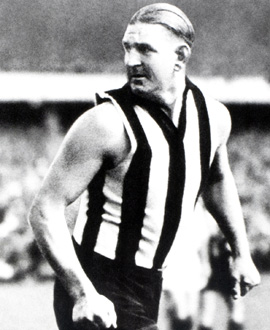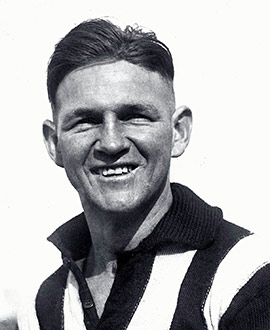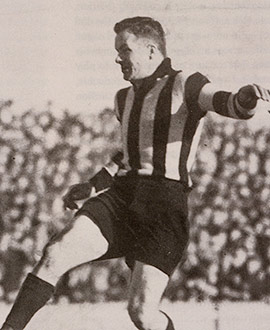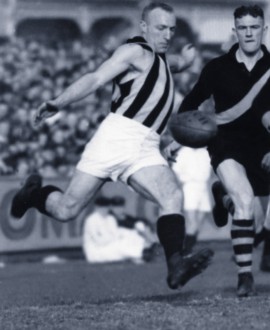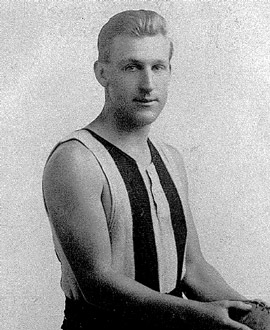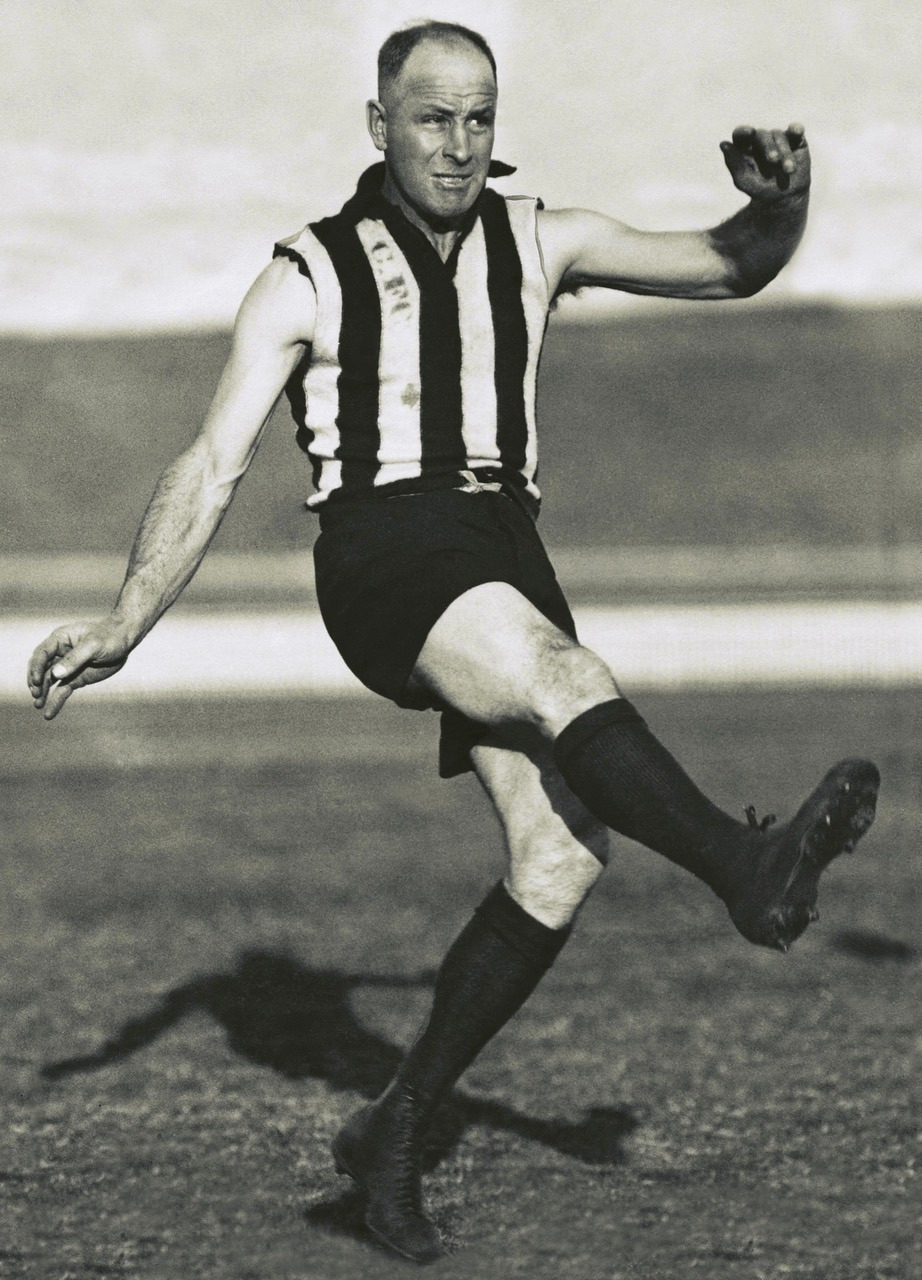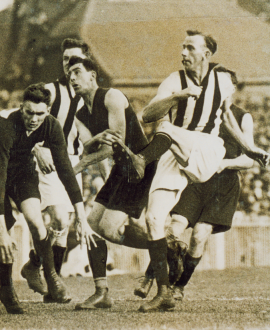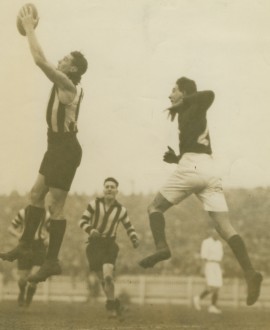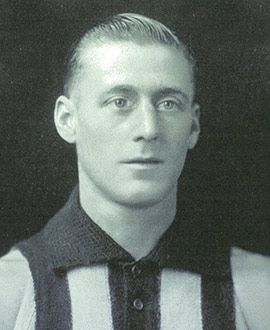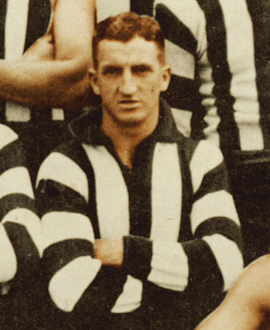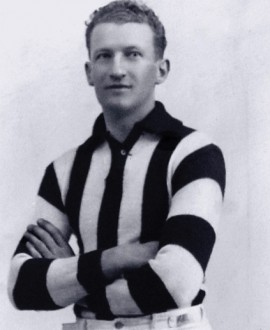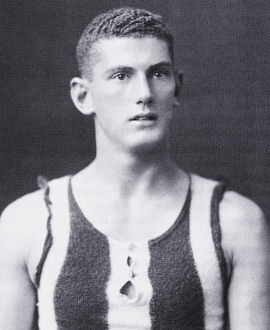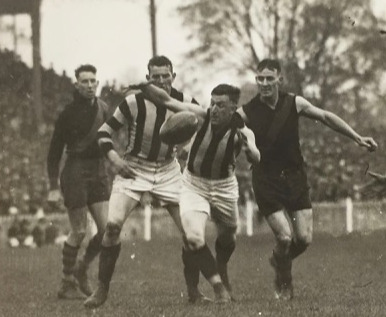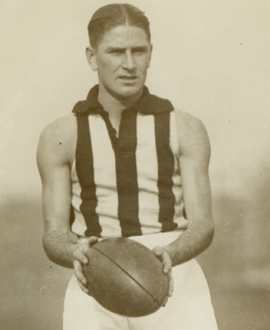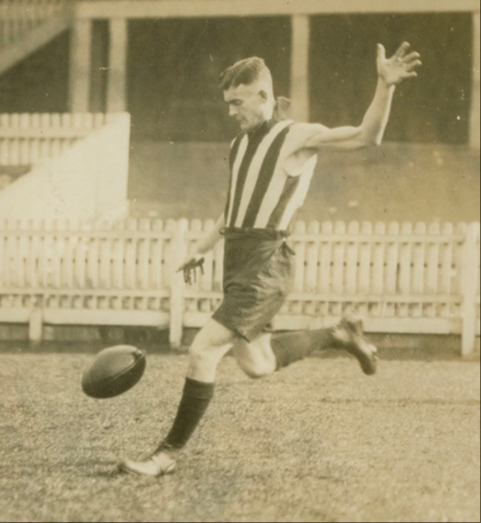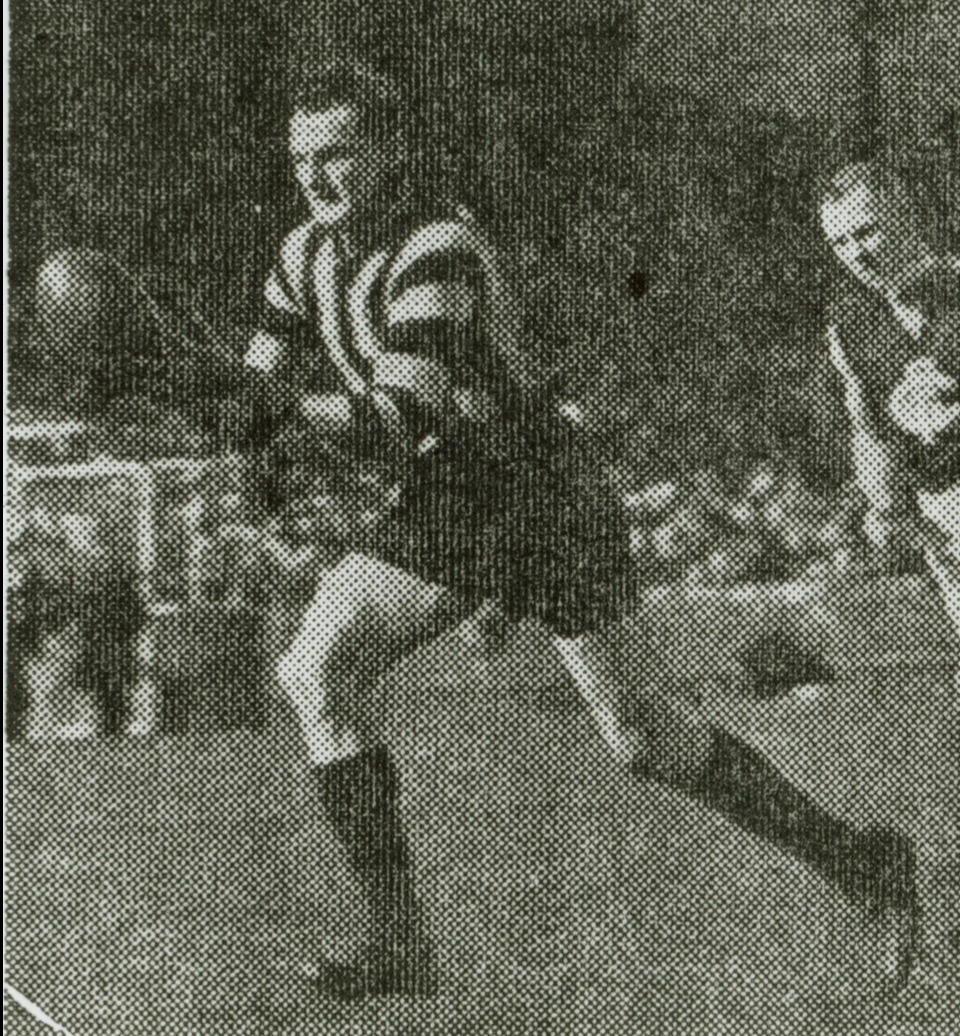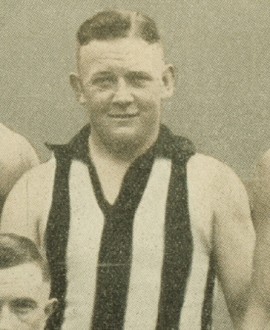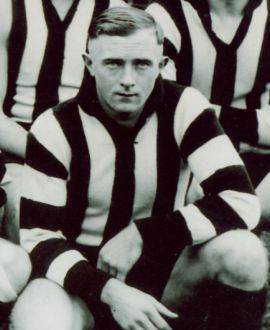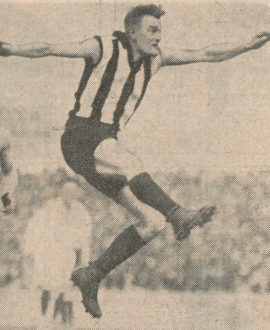Match Report
The Argus Monday 13 October, 1930
LEAGUE GRAND FINAL. COLLINGWOOD WINS.
WONDERFUL THIRD QUARTER HARD, FIERCE GAME.
Premier Team's Unique Record. By OLD BOY.
Collingwood by its victory over Geelong in the grand final of the Victorian Football League competition won the premiership on Saturday in what was perhaps the most dramatic game in the memory of football enthusiasts. A crowd of 45,022 persons attended, the gate takings amounting to £2,061/8.
A week before Geelong had defeated Collingwod by pace and skill, and for half the game on Saturday it seemed that the ambition of Collingwood to win the premiership four years in succession was to be frustrated.
In the first term Collingwood had done remarkably well, but in the second quarter Geelong took complete charge, and had its methods in attack been reasonably sound it must have established such a lead that even the wonderful recovery of Collingwood would have proved unavailing.
There was nothing account for the recovery except that Collingwood, realising that a game is never lost until the end, played with renewed vigour and increased skill, and fairly battered its way to victory. The scores quarter by quarter in the two matches form an interesting study. Collingwood made its great effort in the third quarter each time, but with different results.
Dramatic Change. The change in the fortunes of the game was as dramatic as it was unexpected, but it was none the less convincing. From having been the dominant side Geelong wilted under the indomitable determination of Collingwood, and its lead of 21 points dwindled in six minutes in the third quarter to vanishing point.
Having wiped out the deficit Colingwood, relentless in its energy and determination, proceded to establish a lead and in the next 20 minutes put on 32 points. One could hardly realise that the players who had been outwitted, outpaced, and out-bumped in the second quarter were the same who in the third term rose to a great occasion and triumphed. We have seen many reversals of form in recent years, but none so dramatic, none so sudden, as we saw on Saturday.
It was the more amazing because the astute Collingwood coach, J. McHale, was ill in bed and unable to be present, and thus there was no opportunity for him to make the rallying speech at half-time which has so often spurred the magpies on to victory. The Collingwood room at half-time was a very serious place. There was no repining, no blaming the other fellow, but they all felt they had done their best and had been defeated. Mr. R. Rush took the place of "Jock" McHale, and in an inspiring speech urged the team to use to the occasion. The men, feeling that an extra effort was required, made it, and overwhelmed the opposition and won.
Colllngwood's Record. Collingwood by winning its fourth successive premiership has established a new League record. Essendon, which won the premiership in 1891, 1892, 1893, 1894, also had four years of glory, but that was before the league was established. As a member of that Essendon team I may be pardoned for directing attention to the fact that in 1893 the side was undefeated, and in 1894 it lost only one match—the last of the season—when it was defeated at Geelong. That record of four premierships, one of which was a championship, still stands.
The leading four teams for the season are:—Collingwood 1, Geelong 2, Carlton 3, Richmond 4. Collingwood is a team of record-breakers.
Like D. G. Bradman and W. H. Ponsford in cricket Collingwood in football goes on from one record to another. The season of 1929 gave it several records, and this year it has increased its list thus:—
S. Coventry, its captain, is the only man to lead four premiership teams in succession.
Gordon Coventry, its goalkicker, has scored more goals than any other player, has kicked more goals in a match and in a season than any other player, and on Saturday made a new record by kicking seven goals in a grand final match.
The Geelong score of 9-16 (70 points) is the highest ever made by a defeated team in a grand final.
The Collingwood tally of 2,190 points for the season is the highest ever recorded. Its tally of 54 points to 1 is the highest ever made in a quarter of a grand final game.
Celebrating the Victory. The Collingwood dressing room was a scene of wild excitement after the game. As soon as the ball rang for the finish of the match there was a rush for the room, which soon became overcrowded. A week before, when Geelong won, Collingwood players dressed in comfort. On Saturday it was the opposite. Mr. M. Jacobs (president). A. Coghlan (captain), and Senator Gutherie came to congratulate the premiers on behalf of the Geelong team, and while offering their best wishes regretted their own failure.
They had expected to win, but acknowledged defeat by a better side. Crowds waited outside the room and cheered the players as they left. In the evening there was a great reunion in the clubrooms at Victoria Park whole the mayor of Collingwood congratulated the side, and the enthusiasm knew no bounds. The celebrations will be continued tonight. The Collingwood Town Hall has been secured, and many entertainments have been arranged. Included will be old-time dancing in the small hall and modern dancing in the large hall.
The Play. The name opened at a tremendous pace. It was full of fire and dash was answered with dash. Force was applied everywhere, and though it was fierce it was not unfair. It was evident that each side was out to break the other up, and once wondered how long it would last. The first point went to Geelong, who, attacking the Richmond goal, saw a flying shot by Williams miss the goal by a foot.
There was little wind, the condition being perfect, and the crowd roared as thrust and counter thrust were parried. They had been playing five minutes when a long snap by Troughton gave Geelong first goal, and with Geelong pressing hard there was a clash between A. Collier and Collins.
Geelong shooting wildly added three points before Carney with dash served Llewellyn, who snapped second goal. In a moment Len Murphy replied for Collingwood and the game became fiercer. Each attacked in turn, and Gordon Coventry, pushed by Todd, scored second goal for Collingwood. And so it went on, each playing desperately, but Collingwood scored again, and the quarter ended with Collingwood 3-2, Geelong 2-5. The second term was remarkable. The second term was remarkable, for Collingwood did not score a goal, while Geelong consistently attacking put on four goals (Troughton, Kuhlken, Llewellyn, and Rayson), and might have had half a dozen more had the forward work shown any system. Wonderful work everywhere but in the most essential portion of the field made Coolingwood look second-rate.
In front of goal, however, Geelong was inept-impossible. Men seemed to think a short pass more valuable than a shot for goal, and chance after chance was frittered away. At half-time Geelong led by 6-10 to 3-7 - a margin of 21 points, which with reasonable skill in attack might have been 60. The Third Quarter. The third quarter saw the Collingwood machine functioning in every part.
All over the field the magpies prevailed. Nothing Geelong could do could stop them. In the air, on the ground, in every phase of the game Collingwood held the mastery, and added eight goals (G. Coventry (4), Makeham (2), Beveridge and H. Collier ) six be- hinds to a single point. It was amazing, overwhelming, and in the flying, fighting, tearing tram of magpies one could not recognise the side which had failed so signally a week before.
Geelong was completely outplayed, and the premiership slipped from its grasp. At three-quarter-time Collingwood had the commanding lead of 11-13 (79 points) to 6-11 (47 points). The final term. The final term was without interest. The game was all over. Nothing could save Geelong, and though each side kicked three goals- Edmonds, Gordon Coventry, and Froude- for Collingwood and Troughton. Williams and L. Hardiman for Geelong-there was no sparkle in it, and it ended very tamely, with the scores-
COLLINGWOOD, 14 goals 16 behind (100 points) GEELONG, 9 goals 16 behinds (70 points).
Best Players. COLLINGWOOD had many men at their top with Makeham, who was awarded the prize as most valuable: Andrews, on the wing, was in vincible; Frank Murphy, back and forward invaluable; Rumney solid in defence especially in the third quarter. Beveridge brilliant in the centre; H. Collier, clever, cool, reliable Cheswam a great trier on the wing, where his experience kept Carney in check; Syd. Coventry, the leader in everything; Gordon Coventry, coming into his own after half time; Clayden, happiest when the bumping was hardest.
All did well, but these were the pick. A. Collier spoiled his play by undue attention to the man and incurred the displeasure of the umpire and the crowd.
GEELONG as usual found Todd their sheet anchor. He held the fort wonderfully until, borne down by relentless attacks, he could do no more. Carney on the wing was fast and clever: and Troughton roved ably. Collins did much brilliant work, but had to leave the field with an injured arm in the last quarter. Lancaster taking his place. Mockridge in defence, Coghlan, Evans, and H. Hardiman were the best of the others.
Reference 1930 'LEAGUE GRAND FINAL.', The Argus (Melbourne, Vic. : 1848 - 1957), 13 October, p. 10, viewed 20 August, 2014, http://nla.gov.au/nla.news-article4208428
Final Score Collingwood 3.2 3.7 11.13 14.16 (100) Geelong 2.5 6.10 6.11 9.16 (70)
Goals Collingwood: G. Coventry 7, Makeham 2, Beveridge, H. Collier, Edmonds, Froude, L. Murphy. Geelong: Troughton 3, Llewellyn 2, L. Hardiman, Kuhlken, Rayson, Williams.
Best Collingwood: Makeham, G. Coventry, F. Murphy, Clayden, Andrew, H. Collier. Geelong: Troughton, Llewellyn, Evans, Mockridge, Carney, Todd.
Crowd: 45,022 at the MCG.
Umpire: Scott.


